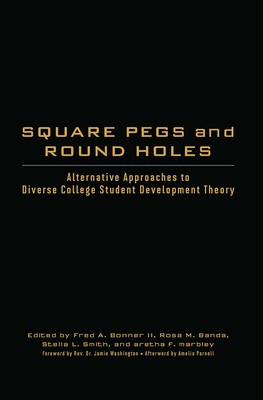
- We will send in 10–14 business days.
- Publisher: Stylus Publishing (VA)
- ISBN-10: 1620367718
- ISBN-13: 9781620367711
- Format: 15.2 x 22.9 x 2.4 cm, hardcover
- Language: English
- SAVE -10% with code: EXTRA
Square Pegs and Round Holes (e-book) (used book) | bookbook.eu
Reviews
Description
Developing alternative student development frameworks and models, this groundbreaking book provides student affairs practitioners, as well as faculty, with illuminating perspectives and viable approaches for understanding the development of today's diverse student populations, and for building the foundation for their academic success and self-authorship.
With the increasing number of adult working students, minoritized, multiracial, LGTBQ, and first-generation students, this book offers readers vital insights into -and ways to interrogate- existing practice, and develop relevant responses to the needs of these populations. Building on and critiquing the past frameworks, and integrating the insights of contemporary scholarship on student development, the contributors collectively put forward a robust theoretical and methodological foundation for this work, using Critical Race Theory as their central frame. CRT allows chapter authors to situate race related encounters at the center of their proposed alternative framework or model, and deconstruct and challenge commonly held assumptions about diverse college student development. In the tradition of CRT, each author offers an alternative model or framework that can be applied to the diverse population upon which the chapter is framed, prompting readers to address such questions as: - Who are our college students?- What set of experiences do our students bring to the higher education context?
- What role have their environments/contexts (i.e. home, p-12, community, family, peer groups, mentors) played in our student's lives?
- What impact have intervening variables (i.e. race, oppression, power) hadon their experiences?
- What strategies do they use to overcome developmental obstacles?
- How do they define success, and how they know they have achieved it ? By laying bare the experiences of these diverse college students that inform this volume's "alternative" frameworks this book contests that notion that they constitute square pegs that must fit into the round holes of traditional frameworks.
EXTRA 10 % discount with code: EXTRA
The promotion ends in 19d.22:36:02
The discount code is valid when purchasing from 10 €. Discounts do not stack.
- Publisher: Stylus Publishing (VA)
- ISBN-10: 1620367718
- ISBN-13: 9781620367711
- Format: 15.2 x 22.9 x 2.4 cm, hardcover
- Language: English English
Developing alternative student development frameworks and models, this groundbreaking book provides student affairs practitioners, as well as faculty, with illuminating perspectives and viable approaches for understanding the development of today's diverse student populations, and for building the foundation for their academic success and self-authorship.
With the increasing number of adult working students, minoritized, multiracial, LGTBQ, and first-generation students, this book offers readers vital insights into -and ways to interrogate- existing practice, and develop relevant responses to the needs of these populations. Building on and critiquing the past frameworks, and integrating the insights of contemporary scholarship on student development, the contributors collectively put forward a robust theoretical and methodological foundation for this work, using Critical Race Theory as their central frame. CRT allows chapter authors to situate race related encounters at the center of their proposed alternative framework or model, and deconstruct and challenge commonly held assumptions about diverse college student development. In the tradition of CRT, each author offers an alternative model or framework that can be applied to the diverse population upon which the chapter is framed, prompting readers to address such questions as: - Who are our college students?- What set of experiences do our students bring to the higher education context?
- What role have their environments/contexts (i.e. home, p-12, community, family, peer groups, mentors) played in our student's lives?
- What impact have intervening variables (i.e. race, oppression, power) hadon their experiences?
- What strategies do they use to overcome developmental obstacles?
- How do they define success, and how they know they have achieved it ? By laying bare the experiences of these diverse college students that inform this volume's "alternative" frameworks this book contests that notion that they constitute square pegs that must fit into the round holes of traditional frameworks.


Reviews